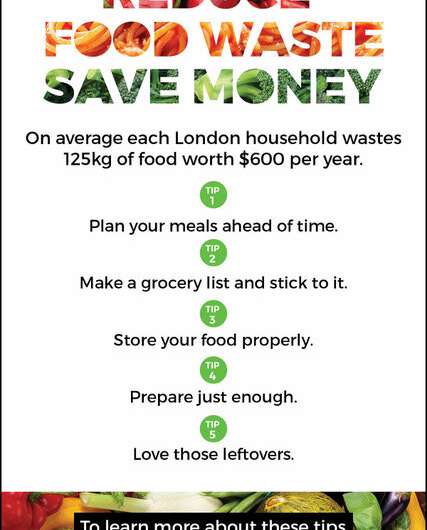Money motivates in reducing food waste, study finds

One of the biggest deterrents to wasting food is getting people to think about what else those wasted dollars could be spent on, according to a Western-led report.
"In terms of changing personal behavior, having to open up your wallet every week and realizing you have to pull less money out for groceries is a key motivator," explained Paul van der Werf, an adjunct Geography professor and environmental consultant in Western's Human Environments Analysis Laboratory (HEAL Lab).
The study, "Reduce Food Waste, Save Money": Testing a Novel Intervention to Reduce Household Food Waste, was recently published in the journal Environment & Behaviour.
For the study, researchers compared the waste habits of two groups of Londoners: 1. A control group who went about their normal habits; and 2. Another group who received a small kit and emails repeating the simple message, "Reduce Food Waste: Save Money."
Researchers also provided households with fridge magnets, grocery-list pads, freezer labels and emails with the same message.
The result of the reminders was a 30 percent drop in avoidable food waste sent to the curb.
Households receiving reminders, the study found, placed at the curb 1.2 kilograms less waste each week, including one kilogram less food waste per week, than the control group.
When asked about what motivated them—whether the environmental effect, the social impact or the cash they saved—respondents said the money motivation consistently fed their enthusiasm, van der Werf said.
These results are worth expanding throughout London and replicating elsewhere in the country, van der Werf argued. It's also a timely reminder as Canada Waste Reduction Week, Oct. 21-27.
People have a tough time visualizing what 125 kilograms of avoidable food waste per household per year looks like, van der Werf said. But when they hear the amount of money they might have spent on other things, people pay attention.
In an earlier study, van der Werf found that wasting food has become a way of life for many Londoners who are tossing an average of $600 into the trash every year.
Extrapolated to all of London households, that could be a savings of more than $75 million.
While van der Werf also notes the additional costs of food waste are significant—including equity and access issues, environmental costs, transportation and landfill space—talking about them doesn't seem to generate the same change in behavior.
"Money savings is physically tangible. You physically spend it. The environment is big and nebulous and we may not know how to do that," he said.
People can buy quantities they know they'll eat; store their food better; eat leftovers more often; freeze what they can't eat immediately, the study offered as ways to eliminate waste.
In London, van der Werf said this study could provide the basis for "a useful frontend" to the start of a green bin program to deal with compostables. The City of London, a partner in the study, is one of the few large Canadian cities without a green bin program.
About 60 percent of what's thrown out on garbage day is food. About half of green bin contents are avoidable waste, such as spoiled lettuce or leftovers forgotten too long in the back of the fridge.
Canadians are taught about the 3Rs—reduce, reuse, recycle," van der Werf said, "we never actually work on the first R."
More information: Paul van der Werf et al. "Reduce Food Waste, Save Money": Testing a Novel Intervention to Reduce Household Food Waste, Environment and Behavior (2019). DOI: 10.1177/0013916519875180
Provided by University of Western Ontario




















